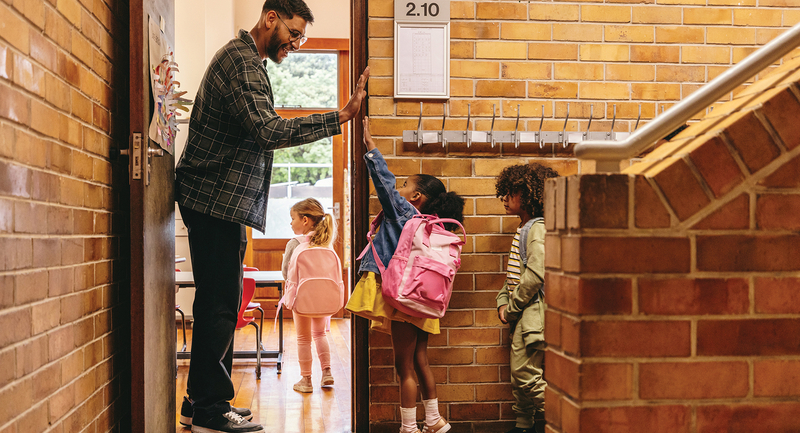October 1, 2022
•
5 min (est.)•
Vol. 80•
No. 2The Support Black Teachers Need Now
Black teachers play a unique role in students’ success—but they need specialized support to sustain the work.

At the height of the pandemic, our country watched another tragedy broadcast across our screens: George Floyd's murder. As nationwide protests ensued for racial justice, educators tried to process what was happening while still grappling with how to educate students under the unprecedented circumstances of a pandemic. Many school leaders paused to ask, What do our students need now? It's an important question, and leaders and teachers alike did what was in their power to answer it.
However, leaders and communities often expect Black teachers to process racial tragedy with their students before they have even processed it themselves. We should also ask: What do Black teachers need now?
The pandemic has pressed on for three years, and teachers have continued to plow forward. Teachers' needs and burdens have increased as schools adapt to our "new normal." The pandemic surfaced decades of health and environmental inequities that put Black Americans at higher risk and resulted in Black Americans dying at higher rates than whites (Harvard School of Public Health, 2020). Healing, critical care, and love have become even more important in our communities after the trauma of loss from COVID-19 and the impacts that poor health and nutrition have on human development.
Schools with predominantly Black student populations, frequently located in communities with increased educational, housing, employment, and transportation needs, often lack the resources to help educators address the issues stemming from these needs. Black teachers often have the added burden of being put in positions to be the school's primary disciplinarian for students of color. To make matters worse, school communities sometimes expect Black teachers to lead their peers through exploring racial justice issues by sharing their own experiences, which can lead to educators revisiting their own trauma—an emotionally exhausting task.
Sometimes called an "invisible tax," the increased emotional burden of these expectations, coupled with the country's recent wave of racial reckoning, has caused increased burnout and shorter careers in the classroom for Black teachers (Terada, 2021).
Recent research reveals that Black teachers play a unique role in the success of all students, especially Black students (Perry, 2019). But currently, there is a lack of innovation—and intention—in the education ecosystem specific to the training, support, and retention of Black teachers. Schools give limited attention to the development and support necessary to leverage Black teachers' increased impact on the academic and socio-emotional development of Black students. And little attention is given to the additional weight on Black teachers who aspire to have this impact.
Fortunately, there are good models for change. The Black Teacher Collaborative (BTC), of which I am a part, exists to advance, innovate, codify, and institutionalize excellent Black education by designing and implementing solutions—programs, learning experiences, and tools—that support Black teachers in the service of Black children. Although some of our solutions are available nationwide and internationally, BTC primarily focuses its work in the southern United States because of the unique history of Black education in the region.
BTC has created a Black Liberatory Pedagogy comprising a comprehensive set of mindsets, knowledge, instructional strategies, and classroom culture practices. These practices seek to build Black teachers' impact and efficacy while cultivating a positive racial identity in Black students and deepening their academic knowledge and skills. We approach these solutions through five educational goals that liberation-based Black teachers have when teaching Black students: (1) love of learning and intellectual excellence, (2) strong racial identity, (3) sociopolitical consciousness, (4) healing, and (5) collective responsibility. In our work, teachers consistently cite the elements of critical care, love, and healing as the foundational elements to enact in their classrooms for students. But the elements of our Black Liberatory Framework are as essential for teachers as they are for Black children. Here are three take-aways for leaders from our work:
Leaders must see Black teachers as content experts with innovative teaching strategies that are culturally relevant and liberatory to their students, and they must provide opportunities for teachers to share their practices and teaching strategies with their peers and staff. As mentioned previously, part of our work is to codify and make more explicit those practices that standout Black teachers already do, like sharing stories that help students connect the concepts to their own lives. Lifting the work Black teachers are doing in the classroom is a form of professional development for all teachers.
For example, the Black Teacher Collaborative is partnering with Clayton County Public Schools in Atlanta this fall to pilot a Black liberatory learning experience for 8th and 9th grade Black Algebra I teachers who teach in predominantly Black schools. The goal is to create an affinity space where participants can learn liberatory mindsets, skills, and knowledge to implement in their Algebra I instruction with Black Algebra I students, as well as build relationships and receive social-emotional support as Black teachers.
During the Summer Intensive, which launched this partnership, teachers practiced intentionally using storytelling to create ties to relevant cultural knowledge. For example, they could precede a lesson on exponential functions with a story relating to interviewing family elders to compile their family tree, then illustrate how one's ancestry follows a binary pattern: two parents, four grandparents, eight great-grandparents, sixteen great-great-grandparents, etc. They might also talk about the history of marching bands and HBCUs—maybe their own HBCU—while students are figuring out how to change a marching band's apex from north to south in a set number of moves. Thus, Black teachers become experts in using Black cultural references to build students' comprehension of the concepts and reinforce their racial mathematics identity.
Recent research (Frank, Powell, & View, 2021) on the attrition of Black math teachers shows that anti-Black microaggressions are a significant factor explaining why these educators leave the profession. Specifically, Black teachers shared stories of their expertise being devalued within the academic space. The biases shared about Black students' inabilities to excel in math and science are reflected in how Black math teachers are often treated by their colleagues. While Black teachers are often praised for their ability to connect to their students socially, they should also be given a platform to demonstrate the strategies they use to build students' understanding of the content.
Include Black teachers in the planning and selection process for teacher-based professional learning and provide opportunities for teachers to integrate their cultural practices into professional learning. This might look like incorporating movement and dance or integrating storytelling opportunities into professional development. At a recent workshop, BTC facilitators led teachers through a line dance set to Beyoncé's "Break My Soul" to energize and center them while also building connection. That activity increased the energy in the room, which allowed for more active collaboration in the activities that followed.
Giving Black teachers opportunities to attend external professional learning events that address their particular instructional needs and allow them to connect with a broader network of teachers can also support them in developing the mindset and skills they need to leverage their expertise. To share just one resource, a free virtual monthly workshop series sponsored by the collective's BTCi3 (Interactive, Innovative, and Immediately Applicable) is a space for Black teachers to learn practical instructional strategies that they can implement immediately in classroom instruction. During our inaugural workshop, participants learned how to utilize a form of Socratic teaching designed to create opportunities for students to examine their beliefs and engage in rigorous discussions about sociopolitical issues and identity. Using Socratic teaching in this way requires a focus on developing sociopolitical consciousness and having students interrogate issues of equity and justice. For example, teachers have incorporated age-appropriate questions about the relationship between education, housing, and income inequality into a discussion about Lorraine Hansberry's play A Raisin in the Sun.
Black teachers need spaces void of mainstream stereotypes and marginalization where they can just be. U.S. school systems have failed to provide an educator workforce that reflects this country's diversity. Black teachers are grossly underrepresented in teaching and administrative roles and thus can feel isolated in their experiences.
Affinity groups—groups of faculty and staff linked by a common purpose, background, or interest, or shared identity like race or gender—can provide safe spaces for Black teachers to process collective trauma, connect through ancestral practices, and show up as their authentic selves. Bethea (2020) noted that such groups "serve as a haven of belonging, offering a space for underrepresented employees to find one another, stave off a sense of isolation, and experience a reprieve from the daily aggressions they've endured at work." Leaders can use the same structures used to create grade- level or content-based professional learning communities to create these racial affinity spaces for teachers. Leaders can also provide space and time for staff to self-create affinity groups based on their backgrounds, identity, and needs. Affinity spaces are an effective strategy for leaders who want to increase teacher collaboration, connection, feelings of belongingness, and joy.
Some leaders are now beginning to see professional learning focused on teacher healing practices as just as valuable as instruction-focused professional learning. In the recent Summer Intensive to launch our Algebra I work with Clayton County Public Schools, we centered healing by bringing in facilitators who started and ended each day with practices that teachers can use during high-stress moments throughout the school day, as well as those that can be integrated into a more long-term self-care ritual. When asked the question What aspects of the workshop did you find most valuable?, most teachers highlighted the healing sessions. One teacher said they valued "really connecting with fellow Black Algebra I teachers and building and brainstorming ideas that support and protect ourselves and our students."
As leaders, being intentional about how we support Black teachers' practice and development will be vital to retaining them. As our society continues to shift and change, creating schools and spaces where Black teachers and Black students can thrive ensures that all students can succeed and actively participate in the ongoing advancement of their communities.
References
•
Bethea, A. (2020, June 29). What Black employee resource groups need right now. Harvard Business Review.
•
Frank, T. J., Powell, M. G., & View, J. L. (2021, February 22). Exploring racialized factors to understand why Black mathematics teachers consider leaving the profession. Educational Researcher.
•
Harvard T. H. Chan School of Public Health. (2020). COVID-19 pandemic highlighting long-standing health inequities in U.S. [Blog post]. In the News.
•
Perry, A. (2019, October 16). For better student outcomes, hire more Black teachers. [Blog post]. Brown Center Chalkboard.
•
Terada, Y. (2021, March 26). Why Black teachers walk away. Edutopia.






